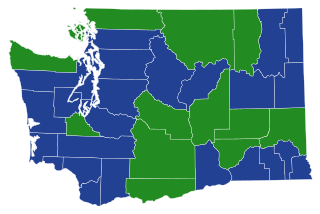In American politics, a superdelegate is a delegate to a presidential nominating convention who is seated automatically.

In the politics of the United States, elections are held for government officials at the federal, state, and local levels. At the federal level, the nation's head of state, the president, is elected indirectly by the people of each state, through an Electoral College. Today, these electors almost always vote with the popular vote of their state. All members of the federal legislature, the Congress, are directly elected by the people of each state. There are many elected offices at state level, each state having at least an elective governor and legislature. There are also elected offices at the local level, in counties, cities, towns, townships, boroughs, and villages; as well as for special districts and school districts which may transcend county and municipal boundaries.
Voter caging involves challenging the registration status of voters and calling into question the legality of allowing them to vote. Usually it involves sending mail directly to registered voters and compiling a list from mail returned undelivered. Undeliverable mail is seen as proof that the person no longer resides at the address on their voter registration. The resultant list is then used by election officials to purge names from the voter registration rolls or to challenge voters' eligibility to vote on the grounds that the voters no longer reside at their registered addresses.
An absentee ballot is a vote cast by someone who is unable or unwilling to attend the official polling station to which the voter is normally allocated. Methods include voting at a different location, postal voting, proxy voting and online voting. Increasing the ease of access to absentee ballots is seen by many as one way to improve voter turnout through convenience voting, though some countries require that a valid reason, such as infirmity or travel, be given before a voter can participate in an absentee ballot. Early voting overlaps with absentee voting. Early voting includes votes cast before the official election day(s), by mail, online or in-person at voting centers which are open for the purpose. Some places call early in-person voting a form of "absentee" voting, since voters are absent from the polling place on election day.
The Utah Democratic Party is the affiliate of the Democratic Party in the U.S. state of Utah. The party describes itself as a big tent party.

The Nebraska Democratic Party is the affiliate of the Democratic Party in the state of Nebraska. Over 700 Democrats are elected across the state of Nebraska. Jane Kleeb is the chair of the Nebraska Democratic Party and also serves as the Midwest Chair of the Association of State Democratic Committees.
The Alabama Democratic Party is the affiliate of the Democratic Party in the state of Alabama. It is chaired by Randy Kelley.

The Uniformed and Overseas Citizens Absentee Voting Act (UOCAVA), P.L. 99-410, 52 U.S.C. §§ 20301–20311, 39 U.S.C. § 3406, 18 U.S.C. §§ 608–609, is a United States federal law dealing with elections and voting rights for United States citizens residing overseas. The act requires that all U.S. states, the District of Columbia, Puerto Rico, Guam, American Samoa, and the U.S. Virgin Islands allow certain U.S. citizens to register to vote and to vote by absentee ballot in federal elections. The act is Public Law 99-410 and was signed into law by President Ronald Reagan on August 28, 1986.
The Federal Voting Assistance Program (FVAP) is a voter assistance and education program established by the United States Department of Defense (DoD) in accordance with federal law to ensure that members of the U.S. armed forces, their eligible family members, and U.S. citizens overseas are aware of their right to vote and have the tools to do so from the country where they are residing.

The Democratic Party of Oregon is the Oregon affiliate of the Democratic Party. The State Central Committee, made up of two delegates elected from each of Oregon's 36 counties and one additional delegate for every 15,000 registered Democrats, is the main authoritative body of the party. The party has 17 special group caucuses which also each have representation on the State Central Committee.
An overseas constituency or overseas electoral district is any electoral district located outside of a nation-state's borders but which is recognized by the state's government as a district for the representation of its expatriate residents who live within the territory of another nation-state. Such constituencies are often organized in order to engage expatriate or diaspora voters who retain their citizenship.

Presidential primaries and caucuses were organized by the Democratic Party to select the 4,051 delegates to the 2016 Democratic National Convention held July 25–28 and determine the nominee for President in the 2016 United States presidential election. The elections took place within all fifty U.S. states, the District of Columbia, five U.S. territories, and Democrats Abroad and occurred between February 1 and June 14, 2016. Between 2008 and 2020, this was the only Democratic Party primary in which the nominee had never been nor had ever become President of the United States. This was the first Democratic primary to nominate a woman for President.
The College Democrats of America (CDA) is the official college outreach arm of the Democratic National Committee. It claims over 100,000 college and university student members in College Democrats chapters across the United States.

Republicans Abroad was a global political organization for Americans living outside the United States until 2013.

The 2016 Democrats Abroad presidential primary took place on March 1–8, 2016. E-mail, fax, and postal voting were carried out from January 11 to March 8, while in-person voting took place from March 1–8. Results were released on March 21.
Non-resident citizen voting is citizens voting in elections according to their citizenship while not residing in the country of the election. As of 2020 a total of 141 countries grant non-residents such as emigrants or expatriates the right to non-resident citizen voting. There is considerable variation across countries in regard to voter eligibility, voting modalities, i.e. voting in person at diplomatic missions or other physical locations, by post or online, which elections nonresident citizens may vote in, i.e. elections of the national legislature, executive elections, referendums, or sub-national elections, and how nonresident citizen voters are represented. The number of countries enfranchising nonresident citizens accelerated significantly in the 1990s. Social scientists have advanced a number of claims about the causes and consequences of this development and debated its normative implications or pros and cons of nonresident citizen voting.
Democrats Abroad holds a primary awarding delegates to the Democratic National Convention to represent expatriate voters. This primary is conducted as part of the Democratic Party's presidential primaries. In some earlier elections, in place of a primary, a caucus system was used by Democrats Abroad to determine their convention delegations.

The 2020 Virginia Democratic presidential primary took place on March 3, 2020, as one of 15 contests scheduled on Super Tuesday in the Democratic Party primaries for the 2020 presidential election, following the South Carolina primary the weekend before. The Virginia primary was an open primary, wherein any registered voter can vote, regardless of party registration. The state awarded 124 delegates towards the 2020 Democratic National Convention, of which 99 were pledged delegates allocated at the local level.

The 2020 Democrats Abroad Presidential Primary took place from March 3 to 10, 2020, allowing U.S. citizens residing outside the United States and those officially affiliated with Democrats Abroad to participate in the Democratic Party's 2020 presidential nomination process. Spanning more than 230 voting locations worldwide, participants cast their in-person votes across various countries and continents. Alternative voting methods included e-mail and postal mail. The voting period started on Super Tuesday and concluded the Tuesday of the following week. The 2020 Democrats Abroad Global Primary allocated a total of 21 delegates to the 2020 Democratic National Convention. Among these, 13 were pledged delegates, committed to supporting a specific candidate based on primary results, each holding a full vote. Additionally, 8 automatic delegates, unbound to any candidate and each possessing a half vote, contributed to a cumulative total of 17 votes.

The 2020 Washington Democratic presidential primary took place on March 10, 2020, as one of several states voting the week after Super Tuesday in the Democratic Party primaries for the 2020 presidential election. The state-run semi-open primary, which was used instead of party-run caucuses for the first time by Washington's Democrats, awarded 109 delegates to the 2020 Democratic National Convention, of which 89 were pledged delegates allocated according to the results of the primary.









